Trump’s Trade War 2.0 Targets the World: What It Means for Turkey
 trump
trump
The essence of the Trump-era trade war was a push to reshape U.S.-China trade dynamics, targeting what Washington called “unfair trade practices”. But beneath the tariffs, the real issues were global leadership, technological dominance, and manufacturing power. Now, as Trump 2.0 rhetoric gains momentum, the strategy appears to be expanding—not just targeting China, but reshaping global trade flows.
While the United States makes up just 4% of the global population, it controls nearly 30% of global income—and even American citizens are beginning to voice unease over the ripple effects of this growing trade confrontation.
How U.S. Tariffs on China Could Reshape Turkey’s Trade Landscape
In recent years, the U.S.-China trade war has emerged as one of the most influential global trade dynamics. As the U.S. ramps up tariffs on Chinese imports, the impact is felt not just in bilateral trade—but across the entire global supply chain. For developing countries like Turkey, the resulting shifts could bring both opportunities and challenges.
Supply Chain Realignment: A Strategic Opportunity for Turkey
As U.S. companies look beyond China, many are seeking alternative manufacturing bases. Turkey’s proximity to Europe, combined with a skilled workforce, modern infrastructure, and Customs Union access, makes it a prime candidate—especially in sectors like:
-
Textiles
-
Automotive components
-
White goods
-
Furniture
The growing adoption of the “China+1” strategy by multinationals could also lead to increased U.S. investment in Turkey, as firms seek to diversify sourcing without overreliance on Chinese manufacturing.
Increased Competition from Chinese Imports in Turkey’s Domestic Market
While exports may benefit, China’s redirection of surplus goods toward new markets poses risks for Turkey’s domestic producers. With Chinese companies seeking alternative markets, Turkey’s expanding consumer base and strategic location make it an attractive target.
However, this could result in:
-
Heightened price competition
-
Pressure on local SMEs
-
Difficulty for manufacturers to compete with low-cost Chinese goods
To mitigate this, sectoral support mechanisms and protective trade measures may be required to shield vulnerable industries.
Input Cost and Supply Risks from China Slowdown
Turkey imports significant intermediate goods and raw materials from China. If China reduces output due to weakened exports to the U.S., global commodity prices and supply chains may be disrupted, leading to:
-
Increased production costs
-
Longer lead times
-
Currency volatility and trade uncertainty
Such disruptions could negatively affect Turkey’s export competitiveness and industrial productivity.
FDI Shifts: Can Turkey Compete with Asia’s Giants?
As multinational firms reconsider operations in China, Turkey emerges as a competitive investment destination, thanks to:
-
Geostrategic location
-
Young, skilled workforce
-
EU access
However, the competition is stiff—Vietnam, India, and Indonesia are also aggressively courting foreign direct investment (FDI). Without careful sectoral planning, ill-targeted FDI could risk harming domestic industries.
“FDI must focus on value-added sectors and avoid undermining local manufacturing,” analysts warn.
A Double-Edged Sword: Tariffs Create Both Gains and Strains
The new tariff environment triggered by Trump’s policies presents a double-edged effect for Turkey:
-
On one side, it opens doors for increased exports to the U.S.
-
On the other, it brings higher input costs, more competition, and logistical challenges
Turkey’s ability to emerge as a net winner depends on:
-
Strategic industry support
-
Modernized trade policy
-
Incentives targeting high-value sectors
Key Takeaways:
-
Turkey stands to benefit from global supply chain realignment, especially in manufacturing exports
-
Increased Chinese imports may flood local markets, pressuring Turkish SMEs
-
Higher production costs and raw material disruptions could hurt competitiveness
-
FDI inflows depend on smart sectoral focus, not just incentives
-
The success of Turkey’s positioning will hinge on adaptive trade policy and value-added production strategies


